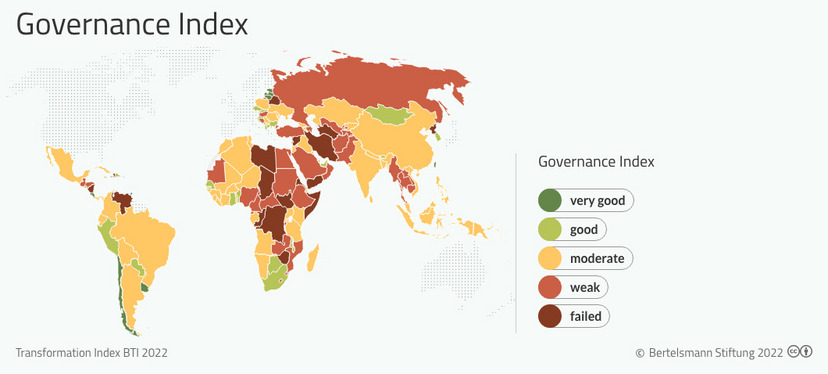A creeping autocratization has long been evident: Over the past 10 years, the quality of democracy has declined in nearly one in five democracies, including in regionally important and once-stable democracies. Meanwhile, many autocracies have further expanded their repression, abuses of power, and restrictions on the freedoms of expression and assembly. Seven states that were considered "defective democracies" just two years ago have been relegated to the category of autocracies in the BTI 2022. The past decade has also seen regime changes in the opposite direction, for instance in Armenia, Sri Lanka and Tunisia. However, these young democracies have experienced numerous setbacks.
![[Translate to English:] Ein Polizist, der geduldig auf der anderen Seite eines wütenden Mobs wartet.](/fileadmin/files/_processed_/a/6/csm_565224087AdobeStock_327707986_KONZERN_ST-NW_bd89673034.jpg)
© jarnoverdonk - stock.adobe.com
Trend toward authoritarian governance continues – Democracy under pressure worldwide
Democracy is losing ground: For the first time since 2004, our Transformation Index (BTI) counts more autocratically governed states than democracies. Among the 137 countries surveyed, only 67 are still democracies, while the number of autocracies has risen to 70. Economic and governance performance also show downward trends, with the coronavirus pandemic having exposed and exacerbated existing weaknesses. However, civil society engagement offers a ray of hope, directed in many places against rising levels of inequality and efforts to dilute democratic standards.
Content
This decline in the quality of democracy has most often been driven by political elites focusing on securing their own political and economic power at the expense of societal development. For more than a decade, the BTI has observed a number of consequences to this trend, including a widespread erosion of the rule of law and civil liberties, growing economic inequality, and an increasing failure of governments around the world to seek broad consensus for policy solutions.
Resorting to authoritarian tactics instead of solving problems is particularly devastating in democratic societies. Trust that has been heedlessly squandered is difficult to restore.
Sabine Donner, democracy expert at the Bertelsmann Stiftung
Few governments pass the COVID-19 stress test
The pandemic functioned as an extreme stress test for all governments, exacerbating problems and undesirable developments. The economic shock triggered by COVID-19 led to a significant decline in economic performance in 78 states. This in turn further constrained governments’ fiscal policy flexibility, making it more difficult to cushion the social consequences of the pandemic. Most critically, however, many governments lack the political will to combat poverty and social exclusion effectively. After years of falling poverty rates, the number of people in need has again risen, even as social inequality has expanded. The BTI has identified massive, structurally embedded social exclusion in 80 countries.
Politically, autocracies in particular used the pandemic to further limit fundamental rights and suppress critical voices. Populists such as Brazil’s President Jair Bolsonaro sought and failed to generate political capital from the pandemic through their polarizing behavior. Instead, their attempts to ignore scientific findings, reject international cooperation and downplay COVID-19’s danger allowed the virus to spread almost unhindered, with severe economic and social consequences.
Democratic decline and poor governance go hand in hand. Populists and autocrats govern in a more dirigiste, inefficient manner, and are thus for the most part less resistant to crises.
Hauke Hartmann, governance expert at the Bertelsmann Stiftung
The pandemic has shown that governments’ ability to manage crises successfully depends very strongly on their governance capacity, as measured by the BTI's Governance Index. Among the 36 states that perform well in this area, there are only three autocracies. However, these countries were just as successful in containing the pandemic as well-governed democracies such as South Korea, Taiwan and Uruguay. For the first time, this year’s edition of the BTI rates more than 100 countries as having governance that is only of moderate quality or lower, falling to failed at worst. The vast majority of these governments proved incapable of responding adequately to the pandemic and its attendant political, economic and social challenges.
Civil societies are resisting authoritarian trends
This year’s BTI report also offers one piece of hopeful news. Around the world, civil engagement and social solidarity emerged with remarkable strength to help bridge gaps in state services, often precisely where governments failed to respond effectively to the pandemic. Civil society actors have also served as the last line of defense in the fight against autocratization, for instance in Belarus, Myanmar and Sudan. They have been vehement in calling for overdue social reforms such as greater social inclusion and representativeness in Chile, and have successfully stood up against persistent corruption and office abuse, as seen in Bulgaria, Romania and Czechia. Today, the greatest impetus toward democratic innovation and renewal is coming far more often from critical civil societies than from governments.
Material
Additional information
Since 2004, our Transformation Index (BTI) has regularly analyzed and evaluated the quality of democracy, economic performance and governance worldwide. The current sample includes 137 developing and transformation countries. The assessment is based on detailed country reports that in sum exceed 5,000 pages in length, produced in cooperation with more than 280 experts from leading universities and think tanks in more than 120 countries. The review period for the current edition was from Feb. 1, 2019 through Jan. 31, 2021. The BTI is the only international comparative index that measures the quality of governance using self-collected data and offers a comprehensive analysis of political management in transformation processes.





![[Translate to English:] Afrika](/fileadmin/files/_processed_/a/b/csm_Freepick__premium_330477_P9LQ1T_359_BTI_ST_NW_Original_83227_ab0d007b50.jpg)



